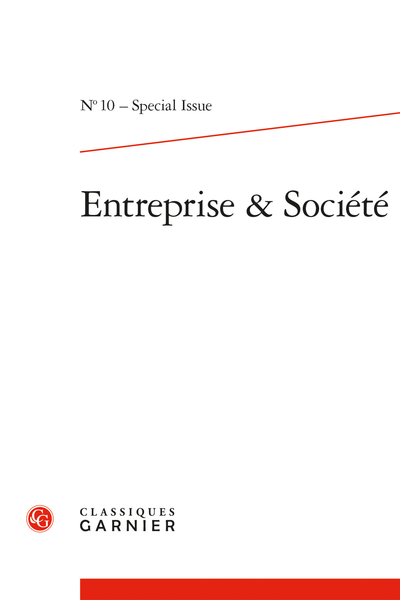
Abstracts
- Type de publication : Article de revue
- Revue : Entreprise & Société, n° 10 - Special Issue. varia
- Pages : 141 à 142
- Revue : Entreprise & Société
- Thème CLIL : 3312 -- SCIENCES ÉCONOMIQUES -- Économie publique, économie du travail et inégalités
- EAN : 9782406142270
- ISBN : 978-2-406-14227-0
- ISSN : 2554-9626
- DOI : 10.48611/isbn.978-2-406-14227-0.p.0141
- Éditeur : Classiques Garnier
- Mise en ligne : 28/12/2022
- Périodicité : Semestrielle
- Langue : Français
ABSTRACTS
Romain Laufer, Jérôme Méric, “‘Wide Angle’. Risk, Uncertainty and Profit by Frank H. Knight. An Anniversary that Delivers Both Evidence and an Enigma”
There are at least two reasons to celebrate Frank Knight this year: the centenary of his great work Risk, Uncertainty and Profit (henceforth referred to as RUP) and the more general sense that uncertainty is now a central concern of societies. There is at least one good reason to do so here in Enterprise & Society (ENSO): Knight’s work delivers one of the first economic theories of the firm, and this theory is directly associated with a theory of the functioning of societies.
Keywords: risk, uncertainty, institution, economics, anthropology.
Jean-Luc Gaffard, “Uncertainty, Market, and Organization. The Meaning and Scope of Knight’s Contribution”
In Risk, Uncertainty and Profit, Knight not only distinguishes between uncertainty and risk. He explicitly addresses the problem of controlling and reducing uncertainty by making it dependent on the form of social organization and not on a calculation of probabilities – which is in any case impossible because of the very nature of the production process, which takes time. The theory of the firm based on transaction costs, initiated by Coase, rejects this approach by dint of being a theory of choice and exchange without any real consideration of either production or uncertainty. Returning to Knight and deepening his analysis requires (i) a recognition, following Arrow, of the imperfection of information and the resulting failures of the price system, which implies breaking with individual rationality to consider the importance of collective action and thus make room for the firm, and (ii) a recognition, following Richardson, of the need for the firm to face the interplay of irreversibility and uncertainty by implementing collusive forms of organization.
Keywords: enterprise, knowledge, production, time, uncertainty.
142Emmanuelle Dubocage, “The Knightian Expertise of the Venture Capitalist. The Value of Frank Knight’s Work in Shedding Light on the Economic Challenges of the 21st Century”
Knight’s thinking is very rich and sheds original light on many issues of economic life. The aim of this article is to show that Knight’s work can at a theoretical level illuminate an understanding of the expertise of a particular type of financier: namely, the venture capitalist. Their expertise, which we describe as Knightian, is based on a capacity for judgment under radical uncertainty, the pillars of which are experience and intuition.
Keywords: radical uncertainty, venture capital, expertise, judgment, experience.
Stéphane Mottet, “Risk, Uncertainty and Behavioral Economics. A Proposal for a Re-reading of Knight”
The classic distinction between risk and uncertainty is a famous one yet its real implications are often ignored. This paper revisits Knight’s essay, particularly his intuitions about what is now known as behavioral economics. Knight’s approach is based on psychology, and tries to better understand people’s attitude towards uncertainty. Unfortunately, the Chicago School (which Knight co-founded) chose to ignore these insights.
Keywords: risk, uncertainty, history of economic thought, behavioral economics.